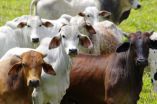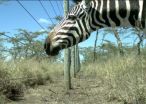(Press-News.org) Berkeley — There is a higher cost to steaks and hamburgers than what is reflected on the price tags at grocery stores and restaurants. Producing food – and beef, in particular – is a significant source of greenhouse gas emissions, which are projected to grow as rising incomes in emerging economies lead to greater demands for meat.
But an encouraging new study by researchers at the University of California, Berkeley, and international collaborators finds that policies to support sustainable cattle ranching practices in Brazil could put a big dent in the beef and food industry's greenhouse gas impact.
The new study, to be published Monday, April 28, in the journal Proceedings of the National Academy of Sciences, found that by subsidizing more productive use of pastureland, and by taxing those who stick with less sustainable practices, Brazil could cut its rate of deforestation by half and shave off as much as 25 percent of all global greenhouse gas emissions from deforestation.
The researchers used an economic model of global land use to assess the effects of encouraging "semi-intensive" cattle ranching practices in Brazil. These practices include better management of pastureland by rotating where animals graze, planting better grasses more frequently, and amending the soil to unlock more nutrients. The authors noted that better land management could double productivity of pasturelands compared to conventional practices, thereby reducing the pressure to cut down more trees.
"These practices are already used commercially on some ranches in Brazil, but they're not yet cost-competitive because of higher upfront costs, so subsidies can provide a needed boost to make the investment worthwhile," said study lead author Avery Cohn, an independent fellow at the UC Berkeley Energy Biosciences Institute and a graduate of the Department of Environmental Science, Policy, and Management. "We found that it's possible to put policies in place that help good behavior outcompete bad behavior."
Local changes, global impact
Over the past several decades, Brazil has risen to become the largest beef exporter in the world. More than 200 million cattle occupy upward of 494 million acres (200 million hectares) of land in Brazil, an area almost a quarter the size of the continental United States. Brazil is also second, behind the United States, when it comes to the production of beef.
While the growth of cattle ranching has been blamed for 75 to 80 percent of Brazil's deforested areas, particularly in the Amazon rainforest, the study authors emphasize that many factors beyond beef production cause deforestation. These include mining, logging and the production of other agricultural crops.
The researchers point out that roughly 200 million acres of cattle pastureland could be used more efficiently, either for higher yield cattle ranching or to grow other crops.
"Our study doesn't just ask whether policies affecting beef production will impact deforestation. We're the first to look at Brazil's national policies in an international context by asking what would happen if Brazil did this even if other countries did nothing," said Cohn, now an assistant professor of environment and resource policy at Tufts University. "Can the world see benefits from what Brazil does? Our findings indicate that the answer is yes."
Exploring options and tradeoffs
Because beef is such a greenhouse-gas intensive food, the researchers looked for unintended impacts, such as lowering beef prices to the point where people want to consume more, or raising beef prices to the point where beef production is increased elsewhere.
"We did find that there was some increase in beef consumption with the policies, but one of the big takeaways from this study is that the effect is overshadowed by other gains in reducing deforestation and greenhouse gases," said Cohn, who was supported by the International Institute for Applied Systems Analysis while he was a UC Berkeley student.
The study authors say the subsidy and tax policies present a cost-effective method for Brazil to meet its greenhouse gas reduction targets.
"There's this notion that fighting climate change requires a stark tradeoff for emerging economies, that they must forego development to meet their emissions target," said Cohn. "This paper suggests that there is a pathway where that compromise may not be needed."
INFORMATION:
Michael O'Hare, UC Berkeley professor of public policy, also co-authored this study. The study team also includes researchers from the Commonwealth Scientific and Industrial Research Organization and the University of Natural Resources and Applied Life Sciences in Vienna.
The National Academy of Sciences, the National Science Foundation and EBI helped support this research.
How Brazilian cattle ranching policies can reduce deforestation
2014-04-28
ELSE PRESS RELEASES FROM THIS DATE:
Brazilian agricultural policy could cut global greenhouse gas emissions
2014-04-28
Brazil may be able to curb up to 26% of global greenhouse gas emissions from deforestation by encouraging the intensification of its cattle production, according to a new study from researchers at the International Institute for Applied Systems Analysis (IIASA) and international collaborators.
The study, published in the journal Proceedings of the National Academy of Sciences, showed that by subsidizing semi-intensive pasture-based cattle production or taxing conventional pastures Brazil may be able to deliver a substantial cut in global greenhouse gas emissions, even ...
Oxytocin promotes social behavior in infant rhesus monkeys
2014-04-28
The hormone oxytocin appears to increase social behaviors in newborn rhesus monkeys, according to a study by researchers at the National Institutes of Health, the University of Parma in Italy, and the University of Massachusetts Amherst. The findings indicate that oxytocin is a promising candidate for new treatments for developmental disorders affecting social skills and bonding.
Oxytocin, a hormone produced by the pituitary gland, is involved in labor and birth and in the production of breast milk. Studies have shown that oxytocin also plays a role in parental bonding, ...
Scientists identify antibodies against deadly emerging disease
2014-04-28
Scientists at Dana-Farber Cancer Institute have identified natural human antibodies against the virus that causes Middle East Respiratory Syndrome (MERS), a step toward developing treatments for the newly emerging and often-fatal disease.
Currently there is no vaccine or antiviral treatment for MERS, a severe respiratory disease with a mortality rate of more than 40 percent that was first reported in Saudi Arabia in 2012.
In laboratory studies reported in the Proceedings of the National Academy of Sciences (PNAS), the researchers found that these "neutralizing" antibodies ...
Study: Tart cherry juice increases sleep time in adults with insomnia
2014-04-28
SAN DIEGO, Calif. April 28, 2014 – A morning and evening ritual of tart cherry juice may help you sleep better at night, suggests a new study presented today at the Experimental Biology 2014 meeting. Researchers from Louisiana State University found that drinking Montmorency tart cherry juice twice a day for two weeks helped increase sleep time by nearly 90 minutes among older adults with insomnia.
These findings were presented Monday, April 28, at the "Dietary Bioactive Components: Antioxidant and Anti-inflammatory Effects of Dietary Bioactive Components" section of ...
Decrease in large wildlife drives an increase in rodent-borne disease and risk to humans
2014-04-28
Populations of large wildlife are declining around the world, while zoonotic diseases (those transmitted from animals to humans) are on the rise. A team of Smithsonian scientists and colleagues have discovered a possible link between the two. They found that in East Africa, the loss of large wildlife directly correlated with a significant increase in rodents, which often carry disease-causing bacteria dangerous to humans. The team's research is published in the Proceedings of the National Academy of Sciences, April 28.
"Our study shows us that ecosystem health, wildlife ...
Smart home programming: Easy as 'if this, then that'
2014-04-28
PROVIDENCE, R.I. [Brown University] — The idea of a smart home sounds promising enough. Who doesn't want a house full of automated gadgets — from light switches to appliances to heating systems — that know exactly when to turn on, turn off, heat up or power down?
But in order for all those devices to do what they're supposed to do, they'll need to be programed — a task the average homeowner might not have the interest or the tech-savvy to perform. And nobody wants to call tech support just to turn on a light.
A group of computer science researchers from Brown and Carnegie ...
Satellite movie shows US tornado outbreak from space
2014-04-28
VIDEO:
This animation of NOAA's GOES-East satellite data shows the development and movement of the weather system that spawned tornadoes affecting seven central and southern US states on Apr. 27-28, 2014....
Click here for more information.
NASA has just released an animation of visible and infrared satellite data from NOAA's GOES-East satellite that shows the development and movement of the weather system that spawned tornadoes affecting seven central and southern U.S. states ...
NIH scientists establish monkey model of hantavirus disease
2014-04-28
WHAT: National Institutes of Health (NIH) researchers have developed an animal model of human hantavirus pulmonary syndrome (HPS) in rhesus macaques, an advance that may lead to treatments, vaccines and improved methods of diagnosing the disease. The study, conducted by researchers at NIH’s National Institute of Allergy and Infectious Diseases (NIAID), is published in the Proceedings of the National Academy of Sciences.
People become infected with hantaviruses by inhaling virus from the urine, droppings or saliva of infected rodents. This infection can progress to HPS, ...
A water test for the world
2014-04-28
HAMILTON, April 28, 2014 – Inspiration can come in many forms, but this one truly was a breath of fresh air.
A group of McMaster researchers has solved the problem of cumbersome, expensive and painfully slow water-testing by turning the process upside-down.
Instead of shipping water to the lab, they have created a way to take the lab to the water, putting potentially life-saving technology into the hands of everyday people.
The team has reduced the sophisticated chemistry required for testing water safety to a simple pill, by adapting technology found in a dissolving ...
Technological advancements extend survival of transplanted hearts across species
2014-04-28
The use of transplant organs from animals (xenotransplantation) could help to compensate for the shortage of human organs available for transplant. NIH researchers have demonstrated that by using hearts from genetically engineered pigs in combination with target-specific immunosuppression of recipient baboons, organ survival can be significantly prolonged. This has potential for paving the way for the use of animal organs for transplantation into humans.
Toronto, ON, Canada, April 28, 2014 – Cardiac transplantation is the treatment of choice for end stage heart failure. ...






